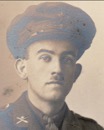George Herbert Coldham

| Rank: | First Lieutenant and Adjutant |
| Regiment: | Machine Gun Corps, 64th Brigade |
| Country: | France |
| Cemetary/Memorial: | Dartmoor Cemetery, Becordel-Becourt, Department de la Somme, Picardie, France (Plot II.C.17) |
| Awards: | British War Medal Victory Medal |
Born on 31st December 1896 in Tunstall, Staffordshire, First Lieuteanant Coldham was killed in France on 17th September 1916, aged 19.
He was the eldest son of the Reverend Henry Roe Coldham (1851-1930) and Katherine Coldham (nee Maynard Cooper, 1896-1937), of The Vicarage, Saint Jude’s Hanley, Stoke-on-Trent. He was one of four children, having two sisters and a younger brother: Gwendoline Maynard (1898-1971), John Maurice (1901-1986) and Geraldine Edith (1905-1985).
George attended Saint Ronan’s alongisde his younger brother. He was in the Scholarship Class.
In the Summer term of 1909 it was said “Coldham, who will be (cricket) captain next year has a nice style and fair defence; a year’s added strength should make all the difference to him; his work in the field, though slow, is fairly safe.” During that season he scored 54 runs, made 7 catches and missed none. In 1910 he scored 302 runs and took 21 wickets for 91 runs and made 8 catches and missed none. That year he was “an excellent Captain”. When it came to football, “though not yet a great back, he tried his best at all times”. During what was an unbeaten season (1910) “with the exception of Coldham, they were not a big lot” and “undoubtedly the most attractive feature was pretty play of the three insides” one of whom was Coldham. He had “splendid shooting powers and a good knowledge of the game”. In a match against Wellesley House he scored 8 goals, against Cottesmore he scored 6 and against Devon House 9.


Saint Ronan’s, 1910 (standing)
In 1910 the school introduced lawn tennis as it “relieved the stress of cricket and prevented monotony”. They produced many good players and Coldham was amongst the best.
In the same year he won the “Goodall Cup” and in the winter term he won the All-Round Prize, the Classics Prize, the Catechism Prize and he maintained the maximum 75 points for Punctuality (5 points were deducted if you were late), the maximum 25 points for Tidiness of Dress and Cleanliness of Person, the maximum 25 points for Method and Order in Lockers, etc, and the maximum of 50 for drills.
On 17th November 1910 the question before the Debating Society was “Whether it would be a judicious action to abolish The Grub Shop?”. The Ronian recorded the proceedings: [Coldham] “rising to his feet, said that he felt sure everyone would agree with him that the subject of this debate should never have been brought forward. It was much too serious a thing to talk about lightly, and he had no reason to believe that there would ever be a necessity to think about it as a possible contingency” the meeting ended shortly afterwards.
Together with Goddall and Crick he formed one of the trio of Head boys. They were described in The Ronian at the time: “we have a trio, than which nothing better has ever been seen at St Ronan’s; their general influence has been splendid and it is very largely due to them that there is, at this moment, a far greater spirit of unselfishness in the school than is usual among boys”.
He left the school in the summer of 1911 to go to Repton. The Ronian recorded his departure: “He leaves behind him a gap which it will be hard to fill. No one has had a better influence in the place and very few as good”.
At Repton he came out first in his form at the end of his first term and was keeping goal and in the 2nd XI for his House.
In December 1914, he was made a Second Lieutenant to the 8th North Staffordshire Regiment. He was seconded to the Machine Gun Corps in February 1916, when he was despatched to France.
“The Reptonian” reported his death in November 1916:
“He was a very useful member of his House, both at work and games. He was a delightful companion, and the possessor of considerable musical talent. His loss will be deeply felt by all those who knew him.”
On 4th October 1916, “The Times” published his obituary:
"Lieutenant George Herbert Coldham, Machine Gun Corps, who died of wounds on September 17, aged 19, was the eldest son of the Rev. H. R. Coldham and Mrs. Coldham, St. Jude's Vicarage, Stoke-on-Trent. He was educated at St. Ronan's, Worthing, under the special direction of Mr. S.S. Harris, and at Repton, where during his four years he was a member of the O.T.C.
At the outbreak of war he applied for a commission, and on December 25 of that year, he was gazetted second lieutenant. After a brief training he was appointed to the 8th North Staffordshire Regiment. He was too young to go out with his battalion when it went to the front, but was transferred to a company of the Machine Gun Corps, and in February of this year he went out to the front as adjutant of a company of the M.G.C.
A brother officer writes: "I cannot tell you how grieved I am at what has happened, for he was not only my most loyal and helpful assistant, but he was also a very great friend. He has done splendid work in my unit as adjutant, and it would be impossible for me to speak too highly of his unfailing energy, his thoroughness, and his character as a man."
